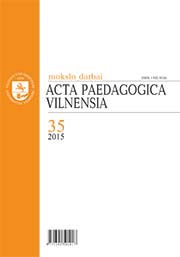10–16 metų mokinių nuostatos dėl matematikos ir metakognityvaus sąmoningumo sąsaja
10–16-year children’s attitudes towards mathematics relationship with met cognitive awareness
Author(s): Raminta Seniūnaitė, Birutė PociūtėSubject(s): Gender Studies, School education, Educational Psychology, Sociology of Education
Published by: Vilniaus Universiteto Leidykla
Keywords: attitude towards math; met cognitive awareness; self-efficacy; problem solving; academic achievements;
Summary/Abstract: Poor results in mathematics, negative attitude towards mathematics, anxiety during math lessons and the lack of confidence in the capabilities of solving math problems are the most serious problems in today’s school environment. The aim of this study was to measure the relationship and expression of 10–16-year-old children’s attitudes towards mathematic and met cognitive awareness. In the present quantitative research, 4–9 grade learners took part. The participants filled in a questionnaire which consisted of a measurement of self-efficacy (Pajares, Miller, 1997), Junior Met cognitive Awareness Inventory (Jr. MAI) (Sperling et al., 2002), Attitude towards Math Inventory (ATMI) (Tapia & Marsh, 2004), problems from the “Kengūra“ contest. Firstly, learners tried to predict their ability to solve three mathematical problems. After that they solved these problems. Finally, they filled all the questionnaires. The results have shown that the attitude towards mathematics is positively related with the met cognitive awareness and self-efficacy. Met cognitive awareness is linked with academic achievements. The attitude to mathematics correlates 10–16-YEAR CHILDRENS’ ATTITUDES TOWARDS MATHEMATICS RELATIONSHIP WITH METACOGNITIVE AWARENESS Raminta Seniūnaitė, Birutė Pociūtė Summary with age, gender and academic achievements. Met cognitive awareness was the same among different grade students. Older learners showed the tendency to have a lower attitude to mathematics, in contrast to younger learners. Younger children are more confident in their abilities in mathematics and enjoy more this discipline. In this research study, the girls had a lower attitude to mathematics than boys. In addition, girls dominated among the learners who had a lower than average attitude to mathematics. Older learners showed the tendency to overrate their capabilities to solve math tasks while younger learners rated their capabilities more accurately. Learners with higher academic achievements showed a more positive attitude to mathematics. According to multiple regression results, the attitude towards mathematics is a predictor of academic achievements, while met cognitive awareness is a predictor of the attitude towards mathematics. According to the results, the positive attitude towards math could be formed by teaching met cognitive awareness.
Journal: Acta Paedagogica Vilnensia
- Issue Year: 2015
- Issue No: 35
- Page Range: 22-44
- Page Count: 23
- Language: Lithuanian

